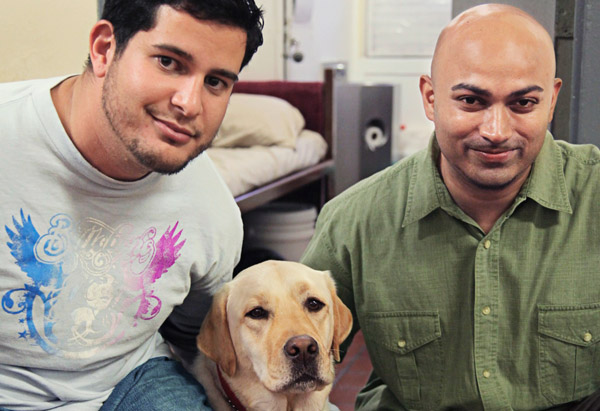A Pup Named Oprah Changes the Life of a Wounded War Vet
A very special canine graduates from a prison service-dog training program—and helps a veteran suffering from PTSD.

Photo: Peggy McDonnell Vance
Sergeant William Pagan (left) and puppy raiser Vijay Ramroop with Lab Oprah, November 2011.
Oprah's reputation precedes her. "She's a social butterfly," people say. "She's so outgoing that she forces you to engage. You can really talk, and she will listen."
The Oprah in question has golden ears, a soft, lustrous coat, and is prone to dousing complete strangers with slobber. At the moment, though, she's snoozing contentedly behind the podium at the front of the room, where a prison official is welcoming us to today's Puppies Behind Bars graduation ceremony. Oprah, along with three other Labrador retrievers napping alongside her, has lived for about two years at Fishkill Correctional Facility, just north of New York City, where she's been lovingly trained by inmates to become a service dog for a wounded war vet. Today she'll start her new life in Philadelphia with Sergeant William Pagan, 31, whose two tours of duty in Iraq have left him with debilitating post-traumatic stress disorder.
But first, Oprah—who got her name as a puppy, after The Oprah Winfrey Show highlighted the work of Puppies Behind Bars—will say goodbye to Vijay Ramroop, who is seated in the audience, his bald head and green prison jumpsuit indistinguishable from that of the two dozen or so other inmates in attendance. Ramroop, 30, is serving up to ten years for his part in a 2005 armed robbery in Nassau, New York, but his affect here is anything but aggressive. Shy and soft-spoken, he says he's been preparing himself for this day since Oprah moved into his cell several months ago, when her original "puppy raiser" was released. "I haven't cried," Ramroop says. "But [her leaving] has broken me down so much." His life has been arranged around Oprah's needs, from getting up at 6 A.M. to let her out (puppy raisers are chosen for their character and good behavior and must juggle training responsibilities with their regular prison jobs) to practicing commands with her during free time. "Sometimes I'd be stressed-out, and she'd just come lie next to me," Ramroop says. "It's like she understands what you're going through."
For the past two weeks, as they've trained together at the prison, Ramroop has been encouraging Oprah to bond with the strapping, wounded sergeant she's been assigned to. Hard as it is, Ramroop tries not even to pet her ("She's confused," he admits). As for Pagan, he's recovering from spinal injuries sustained under fire, and hopes to return to his job at the Department of Defense. Last January his marriage fell apart. He's skittish and paranoid in crowded areas, yet isn't comfortable alone in his apartment. Oprah has been trained to turn on lights, case a room for intruders before Pagan enters it, and wake him from his frequent nightmares, among 90 or so other critical tasks. She'll also force him to get out of the house more. "In the mornings, I just look at her and she's so happy, wagging her tail like, 'Let's go!'" says Pagan, who is overwhelmed by gratitude—for Oprah and Ramroop. "He has so much passion," says Pagan. "He recognizes that he can grow. He's shown me that I can grow." Pagan pauses and chokes up. "I don't care what they did in the past; I would serve with these guys anytime."
More on Puppy Love



